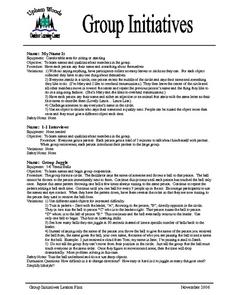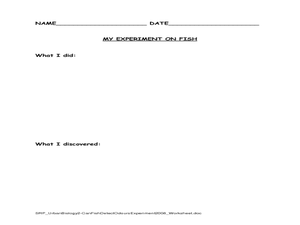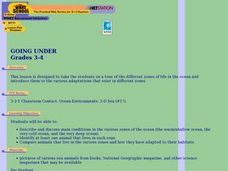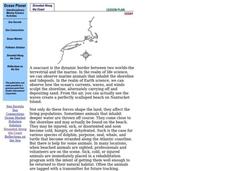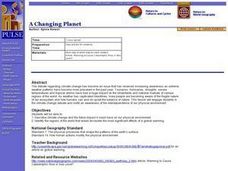Curated OER
More Than a Campground
Fourth graders participate in a class disucssion on the term "habitat". The class brainstorms on what makes a national park special. In small groups, they research a a national park and create a mural depicting those factors that make...
Curated OER
Fossil Formation
Students discuss fossils. In this science lesson, students simulate fossils within Earth's layers by using gummy fish and bread.
Curated OER
The Weight of Water
Students examine how salt water is more dense than fresh water. They discuss how manatees need to float and sink, conduct a sink or float experiment, and conduct an experiment with eggs and salt and fresh water.
Curated OER
CREATE A CAVE
Young scholars investigate the concept of caves by conducting an experiment. The lesson contains background information for the teacher. They collect data while making observations and write a review of the concept once the experiment is...
Curated OER
Group Initiatives
Students explore the names and qualities about members in the group. They each say their name and something about themselves. Students gather around in a circle. They listen to the teacher as he or she says the name of someone and throws...
Curated OER
CSI Clamshell Investigation
Pupils explore and explain how moon snails eat and where the holes in clamshells come from and then draw conclusion from the data collected. They incorporate math and graphing skills to determine if there is a relationship to a clam's...
Curated OER
The Science of Weather: Hurricanes
Students use this USA today activity to learn about hurricane season. In this hurricane lesson plan, students study the map of the earth and hurricane science. Students complete discuss questions. Students draw a map of the United States...
Curated OER
Urban Biology: Can Fish Detect Odors
Students investigate how fish use their sense of smell. In this scientific method activity, students design and perform an experiment to investigate how fish use their sense of smell. This activity includes statistical analysis and...
Curated OER
Art/Ocean Scene
Students draw and color an ocean scene based on the paintings of Wyland. In this ocean art lesson plan, students view slides of seascapes before they complete their project using oil pastels.
Curated OER
Stranded Along The Coast
Students reflect and investigate how a seacoast is the dynamic border between two worlds-the terrestrial and the marine. In the realm of life science, we can observe marine animals that inhabit the shoreline and tidepools. In the realm...
Curated OER
It's Getting Hot out Here! Should I be concerned? (Climate Change)
Students explore the effects of global warming. They examine the differences between weather and climate. After viewing a video, students summarize information on climate change and drought.
Curated OER
Immersion Presents Monterey Bay
Students study Monterey Bay. For this Monterey Bay lesson, students create a model of upwelling around Monterey Bay. Students simulate surface water movement relative to prevailing winds.
Curated OER
How Islands Form
Students how islands form, rising water levels, growth of coral, and volcanoes. They complete Island Investigation worksheets after researching island formation on various Internet websites.
Curated OER
Observing Brine Shrimp
Students observe brine shrimp eggs, create an appropriate environment for their survival, and observe their growth.
Curated OER
Have to Have a Habitat
Students create a zoological and botanical garden made up of a variety of species from around the world.
Curated OER
Food Webs
Students research what food is eaten by the following organisms: penguins leopard seals, krill, elephant seals, petrels, albatross, fur seals, squid, insects and grass. They make a food web using the data they have gathered.
Curated OER
What Lives In A Shell?
Second graders study the readily observable characteristics of marine invertebrates, 2nd graders research the invertebrates and complete worksheets in this series of lessons.
Curated OER
Oil Spill Dangers
Students analyze the effects of oil spills on our environment and develop action plans to protect animals and habitats.
Curated OER
Food Webs
Students recognize interdependence in a food web by using yarn and notecards to create a food web and discussing what would happen if one of the organisms from a certain trophic level is removed.
Curated OER
Corals and Coral Reefs
Students label the continents, oceans, and seas on a provided world map and use it to determine where they would expect most of the world's coral reefs to be found based on provided information the teacher has read to them.
Curated OER
Starfish Project
Students discuss ocean waters, tides, tide pools and the animals which live in the tide pools. They practice the push and pull method with a chink of clay to create a starfish from clay. They apply texture and decorate the starfish...
Curated OER
A Changing Planet
Learners describe climate change and the future impact it could have on our physical environment. They identify the regions of the world that would encounter the most significant effects of a global warming.
Curated OER
Bible Activity-- Mark 8:27-38
In this Bible worksheet, students study the story and lessons in Mark 8:27-38(the disciples and Peter). Students complete activities on 7 pages including crosswords, codes, coloring, mazes, and word search.
Other popular searches
- Sea Prehistoric Animals
- Sea Animal Life Cycle
- Sea Animal Research
- Animal Under the Sea
- Animals. Sea
- Sea Animal Art
- Sea Animal Research Projects
- Animals Sea
- Sea and Land Animals
- Sea Animal Game
- Sea Animal Defenses
- Sea Animal Lesson Plans




